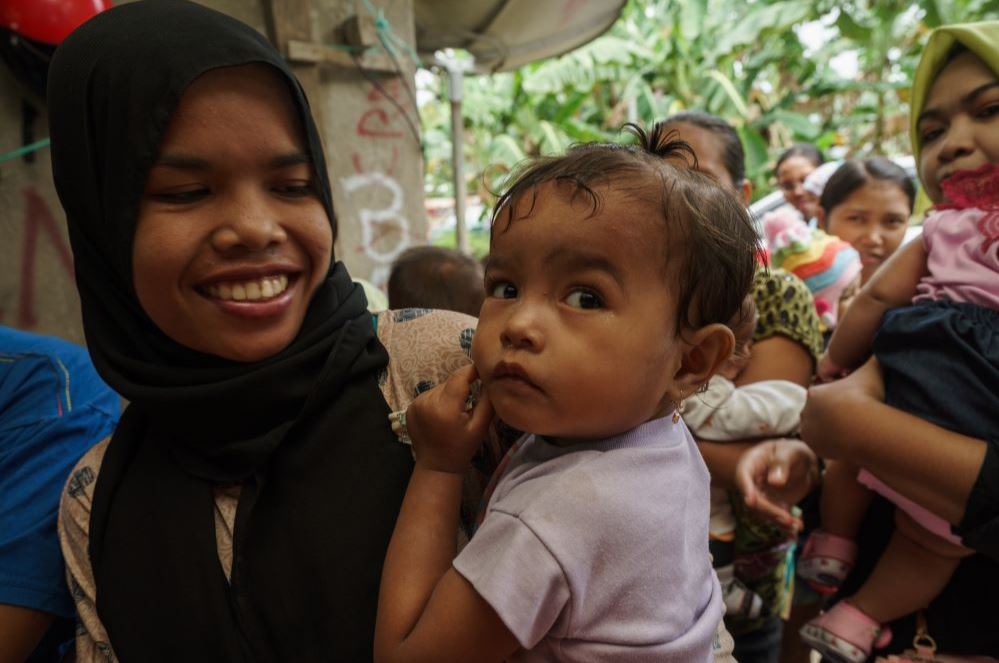Field Stories
Ten inspiring global nutrition stories
December 17, 2024
WP_Term Object
(
[term_id] => 48
[name] => News
[slug] => all-news
[term_group] => 0
[term_taxonomy_id] => 48
[taxonomy] => news-category
[description] => Stay up to date on our announcements, newest projects and partnerships, and news about how we’re making a difference in the lives of people around the world.
[parent] => 0
[count] => 272
[filter] => raw
)
Nutrition International and the Government of Indonesia helping to prevent and reduce stunting by reaching pregnant women and children under five with essential micronutrients
Nutrition International, in partnership with the governments of Indonesia, Australia and Canada, reached 211,000 pregnant women with iron and folic acid supplementation, 720,000 children with two doses of vitamin A and 64,000 children under five suffering from diarrhoea with zinc and oral rehydration supplements (ORS), as part of its MITRA program.
Posted on January 14, 2020


Jakarta, Indonesia — Nutrition International, in partnership with the governments of Indonesia, Australia and Canada, reached 211,000 pregnant women with iron and folic acid supplementation, 720,000 children with two doses of vitamin A and 64,000 children under five suffering from diarrhoea with zinc and oral rehydration supplements (ORS), as part of its Micronutrient Supplementation for Reducing Mortality and Morbidity (MITRA) program. Since 2015, this integrated micronutrient program has been implemented in 20 districts of East Java and East Nusa Tenggara provinces to improve access to health services for both pregnant women and caregivers of children under five. Key results of the MITRA program were shared today with the government representatives and officials from the Ministry of Health, Bappenas, development partners, academia and media.
As part of the MITRA program, Nutrition International supported the national, provincial and district level governments in Indonesia to strengthen commitment for micronutrient supplementation programs by increasing the resource allocation for procurement, management and implementation of these programs. The program also focused on improving access to healthcare services and building awareness about micronutrient supplementation through behaviour change intervention (BCI) strategies.
“The government is committed to fight against stunting. We acknowledge the support of Nutrition International in strengthening micronutrient supplementation programs and improving the program management in provincial and district levels. Some good practices of the program have been adopted in other districts beyond MITRA. We understand the efforts to strengthen micronutrient supplementation can reduce stunting and are keen to discuss ways of scaling up the innovative practices to other districts, especially those with high prevalence of stunting,” said Dr. Kirana Pritasari, Master of Quality Improvement in Healthcare, General Director of Public Health, Indonesia Ministry of Health.
The MITRA program has demonstrated an effective approach to improve micronutrient programming with significant lessons learned around a range of areas, including forecasting, budgeting and procuring micronutrients; ways in which staff of Puskesmas (or primary healthcare centres) can persuade caregivers to use ORS and zinc instead of antibiotics to treat childhood diarrhoea; and leveraging advocacy to influence district governments to ensure adequate budgets for micronutrient interventions.
“We know nutrition is not just the basis of good health, it is the foundation for a better future,” said Dr. Sri Kusyuniati, Country Director, Nutrition International. “Working in Indonesia for over a decade, we understand the nation’s public health challenges thoroughly and have devised multiple interventions to address them. MITRA is one such initiative that is close to our heart as it brings improved health and nutrition practices to those who need them the most.”
In addition to reaching high need communities with better nutrition and health opportunities, Nutrition International also trained approximately 700 front-line health workers, supervisors and managers from provincial health offices, district health offices and Puskesmas on monitoring, reporting, forecasting and counselling skills. More than 400 Puskesmas in 20 selected districts received the BCI materials on counselling skills and promotion of health messages associated with anaemia and diarrhoea management. Nutrition International also supported to bridge the gaps in the supply chain of iron and folic acid, zinc & ORS, and vitamin A.
Stunting prevention and reduction is a public health priority for Indonesia. The National Strategy to Accelerate Stunting Prevention is a significant step towards ensuring that all households with pregnant women or children under two get access to a complete package of services essential to prevent stunting. Nutrition International’s MITRA program has contributed to the government’s priority area and has successfully introduced innovative approaches, activities and tools to improve health and nutrition of people living in vulnerable situations. The program and its best practices now need to be scaled up nationally and to other provinces with high stunting prevalence.